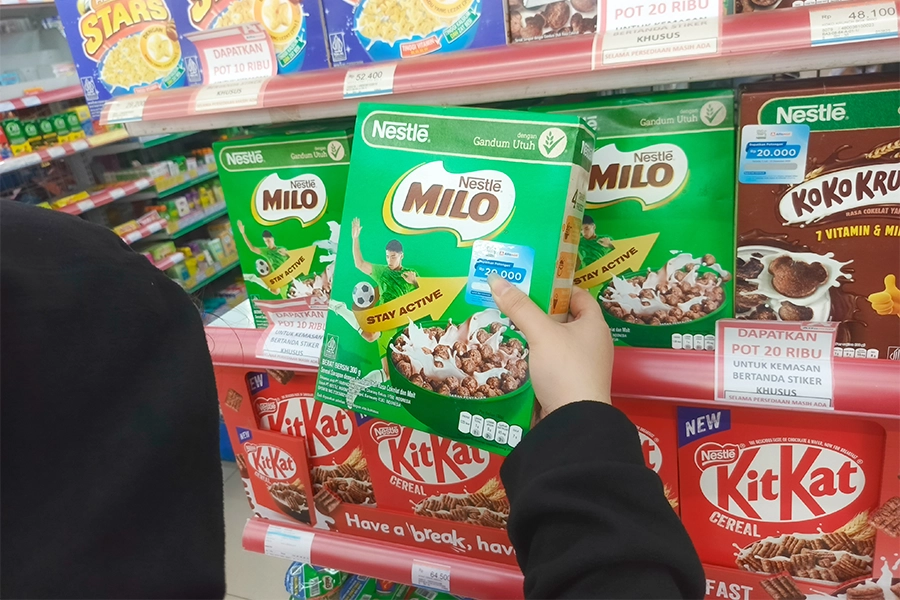
- Industry news
Industry news
- Category news
Category news
- Reports
- Key trends
- Multimedia
- Journal
- Events
- Suppliers
- Home
- Industry news
Industry news
- Category news
Category news
- Reports
- Key trends
- Multimedia
- Events
- Suppliers
US F&B giants form ingredient transparency coalition as critics question motives
Key takeaways
- Major food and agriculture companies have launched the Americans for Ingredient Transparency coalition to advocate for a uniform national standard on ingredient transparency and labeling.
- The coalition’s policy agenda centers on reforming the GRAS process, standardizing front-of-package labeling, and consolidating ingredient safety authority under the US FDA.
- Consumer advocacy groups criticize AFIT, arguing it’s an industry-driven effort to weaken or block stricter state-level food safety laws.

Major F&B, agricultural, and consumer product associations in the US have launched an advocacy coalition pushing for a uniform national standard for ingredient transparency regulation. The Americans for Ingredient Transparency (AFIT) coalition argues that disparate state rules create a maze of regulations that burdens producers and confuses consumers.
The coalition, which is structured as a non-profit and includes industry powerhouses like PepsiCo, Coca-Cola, Nestlé, General Mills, Tyson Foods, and Kraft Heinz, has four key policy priorities: reform of the GRAS (Generally Recognized As Safe) process; front-of-package labeling reform; QR code requirement on packaging; and federal pre-emption of state laws.

Many US states have started adopting or proposing stricter, ingredient-specific laws, which can vary from state-to-state. For example, the California Food Safety Act, enacted in October 2023, bans the use of four specific additives, while West Virginia became the first US state to impose a sweeping ban on multiple synthetic food dyes and additives in March this year.
“Americans want to know that the ingredients in the products they’re buying for their families are safe. Our goal is to cut through confusion, and ensure everyone has access to clear information,” says Andy Koenig, senior advisor to the coalition.
However, some consumer advocacy groups are critical of AFIT, suggesting that while the coalition claims to promote transparency, its actual agenda is to derail stricter state laws.
The Environmental Working Group (EWG), for example, claims “AFIT’s real mission is blocking state laws that require companies to disclose or remove harmful chemicals from foods…the group wants to not only undermine those existing laws but also ensure states cannot adopt similar safeguards in the future.”
The AFIT’s emergence comes as the US Department of Health and Human Services pushes to reform national health policy. Chaired by Robert F. Kennedy Jr., the “Make America Healthy Again” movement targets ultra-processed foods, food additives, artificial colorants, and synthetic chemicals.
Americans for Ingredient Transparency
The coalition wants all new ingredients to go through a national, consistent process, and for the US FDA to be the only authority on ingredient safety and labeling regulations to address conflicting state standards.
It advocates for a standard label on the front of product packaging to guide consumers toward healthier choices, and scannable QR codes enabling consumers to access ingredient and safety information instantly. US food giants launch a coalition for national ingredient transparency, but critics say it’s a bid to block tougher state food safety laws.
US food giants launch a coalition for national ingredient transparency, but critics say it’s a bid to block tougher state food safety laws.
Industry commentators suggest AFIT is positioning itself as a partner to regulatory reform, aiming to shape how the FDA and US Congress manage ingredient disclosure and safety. Critics of the coalition argue it is attempting to undermine more progressive state laws that could require product reformulations.
AFIT has also secured membership from agricultural organizations, including the American Farm Bureau Federation, the National Milk Producers Federation, and the Meat Institute.
“Our members grow the ingredients that feed America — we need one clear, science-based standard, not fifty different state rules,” says a spokesperson for the National Corn Growers Association.
Backlash to the coalition
Some consumer advocacy groups have opposed the coalition, accusing it of hiding its true intentions. Consumer Reports, for instance, has expressed concerns that the federal pre-emption of state laws would weaken protections for consumers rather than strengthen them.
“If there were truth-in-labeling laws governing the naming of campaigns, this coalition would be prohibited from disguising their true intention, which is to wipe out all of the state laws that protect consumers from harmful chemical ingredients in food and hold the industry accountable,” says Brian Ronholm, director of food policy at the consumer advocacy organization.
“It’s disappointing to see these giant food companies investing millions of dollars on high-priced lobbyists and ad campaigns to mislead the public and policymakers instead of removing toxic ingredients from their products.”
Meanwhile, the EWG suggests the coalition’s real aims are about defending industry interests rather than consumers. “This [AFIT] is about protecting corporate profits and keeping consumers in the dark about toxic chemicals in their food,” says Scott Faber, the EWG’s senior vice president for government affairs. As US states tighten food safety laws, major brands rally for a single national transparency standard — raising questions about whether consumers or corporations benefit most.
As US states tighten food safety laws, major brands rally for a single national transparency standard — raising questions about whether consumers or corporations benefit most.
“Families deserve the truth about what’s in their food, not another slick PR campaign cooked up by industry to deceive the public and roll back state food safety laws.”
Walmart reformulates private-brand foods
This month, Walmart pledged to scrap synthetic dyes and controversial ingredients, including certain preservatives, artificial sweeteners, and fat substitutes, from its private-brand foods.
“Our customers have told us that they want products made with simpler, more familiar ingredients — and we’ve listened. By eliminating synthetic dyes and other ingredients, we’re reinforcing our promise to deliver affordable food that families can feel good about,” says John Furner, president and CEO of Walmart.
New research by Innova Market Insights suggests that breakthroughs in plant-based colorants will inspire the shift toward natural colors and clean label alternatives in the US F&B market, as regulators and consumers rapidly turn against artificial colors.









